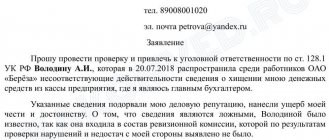From time immemorial, there have been people who dream of taking possession of other people's property in an easy way, by gaining the trust of the victim or by deceiving him. In legal language, such actions are called fraud.
And in order for affected citizens and legal entities to protect their rights, in many cases it is necessary to write a statement to the prosecutor’s office about fraud.
To ensure the legal literacy of the common man, in this article we will talk about how to correctly write a statement to the prosecutor's office regarding fraud (it can be downloaded here), bring the swindler to criminal liability and get your money back. So.
When can and should you contact the prosecutor's office regarding fraud?
First of all, it should be understood that fraud as an offense has many manifestations. If you open the domestic Criminal Code, you can find as many as 6 articles in it, devoted to various forms of fraud.
We should also not forget that for minor offenses (within 1 thousand rubles) administrative liability arises, provided for in Art. 7.27 Code of Administrative Offenses of the Russian Federation.
Most fraud cases are handled by the police. However, if fraud has occurred, contacting the prosecutor's office may also be advisable. Thus, a complaint should be filed with this authority when police officers refused to initiate a criminal case at the request of the injured party.
In addition, a statement to the prosecutor's office is written in the case when the subject of fraud is an official of an enterprise or institution. In all other cases, the prosecutor's office does not consider fraud, but transfers the materials to the police for further work with them.
Where to apply
Before considering this issue, we draw the attention of readers to the fact that the application must be submitted as quickly as possible, immediately after you discover a violation of your rights, even if you are not sure of the qualifications of the offense.
So, you can submit your application:
- To the territorial police department at the place where the crime was committed. If there were several episodes of illegal actions, choose the area where the last crime or the majority of those committed was committed. You can submit an application in person or through the official website of the Ministry of Internal Affairs. Based on practice, they will begin consideration faster if you submit your application in person to the duty station. There, your written request must be registered in the message book and you must be given a so-called coupon indicating the assigned number. Under no circumstances refuse to take this ticket, keep it carefully - in case of red tape and negligence on the part of the police, this document will be needed.
- To the prosecutor's office. As a general rule, such applications are not submitted to this organization. But, by virtue of the job descriptions of this department, its employees are obliged to accept and register any application from citizens. Therefore, your statement regarding fraud will be accepted by the prosecutor’s office and sent to the police department within three days, with instructions to conduct a procedural check. The disadvantage of contacting the prosecutor's office can be considered, taking into account the referral under jurisdiction, a longer period of consideration (sometimes this is very important, the clock can count). One of the advantages is the unconditional implementation of the instructions of prosecutors by police officers, so there is a high probability that the consideration of an application received from the prosecutor’s office will be treated more carefully and promptly.
Please note that if damage is caused as a result of fraudulent actions on the part of representatives of any legal entities, you can, in parallel with the statement of crime, submit to the district prosecutor's office an application for the need to check the activities of the organization in general.
Composition of the crime and participants
Generally, fraud refers to obtaining money or property through deception or breach of trust.
Transferring money using forged or knowingly false documents is also considered fraud. This type of crime is typical for the banking, insurance or social sectors.
Computer scammers are also common, using modern technologies to gain access to other people’s data and bank accounts.
Fraud consists of deliberate evasion of execution of contracts concluded between business representatives.
What distinguishes fraud from theft or robbery is that the victim voluntarily transfers property to the attackers.
Fraudsters can act either alone or in organized groups. The injured party is both citizens and enterprises (institutions). However, there may be several victims of fraud.
Fraud involving or in relation to individual entrepreneurs and commercial organizations
Until recently, the injured party had the right to file a complaint with the prosecutor's office about fraud by a legal entity. Criminal liability for enterprises was provided for in Article 159.4 of the Criminal Code of the Russian Federation. However, this provision has now been excluded from the legislation.
Therefore, officials of organizations or individual entrepreneurs are responsible for fraud in the business environment. Depending on the crime, liability arises under Part 3 or 5 of Article 159.
However, it happens that the fact of illegal actions is difficult to prove. Therefore, prosecution is largely determined by a sufficient number of documents and testimony.
In addition, the participation of a criminal lawyer would also be useful. He knows first-hand how to properly protect the rights of the victim. .
Fraud involving or against an individual
In this case, an application to the prosecutor's office about fraud by an individual is submitted with reference to the relevant article of the Criminal Code of the Russian Federation. Therefore, it is advisable to study the rules of criminal law before writing a statement.
You can attach not only documents to your application, but also video footage, recordings of telephone conversations, and printouts from email. Basically any evidence you have.
Complaint about committing a crime: the essence of the document
There are no requirements for the content of the statement in the Criminal Code. It is drawn up by the victim or his representative in any form. Regardless of the wording of the application, its structure, it will be registered and a check will begin on it in accordance with Art. 144, 145 Code of Criminal Procedure of the Russian Federation.
However, the basic rules for completing applications should be considered in more detail:
- The application must contain the date of signature and passport details of the person submitting it. You must include your full name and registered address in the application;
- The statement includes a description of the crime that occurred. The place, time and method of committing fraudulent activities should be indicated. The description should be detailed but concise;
- The application must include information about the damage caused. You need to reflect a specific amount. In addition, the document must indicate whether the damage is significant or not. This is important for qualifying the crime, since if it is significant, the crime will be more serious. In this case, significant damage cannot be less than 5,000 rubles.
The application must contain a request to conduct an investigation and initiate a criminal case.
Procedure and terms for consideration of the application
Received materials are signed by the responsible employee of the prosecutor's office. He checks the correctness of the application and the presence of all required information in it.
Then there is a certain procedure for checking the information contained in the appeal. Depending on the specific case, the period for processing the application is from 3 to 10 days.
After this, the prosecutor's office issues a decision based on the results of consideration of the application. If the complaint of the victim of fraud is satisfied, then the resolution specifies a list of those actions (with deadlines) that must be carried out by the police.
The legislative framework
- Order of the Prosecutor General's Office of Russia "On approval and implementation of the Instructions on the procedure for considering applications and receiving citizens in the prosecutor's office of the Russian Federation" No. 45 dated January 30, 2013.
- Order of the Ministry of Internal Affairs of Russia “On approval of the Instructions on organizing the consideration of citizens’ appeals in the system of the Ministry of Internal Affairs of the Russian Federation” No. 707 dated September 12, 2013.
- Federal Law “On the procedure for considering appeals from citizens of the Russian Federation” No. 59-FZ dated May 2, 2006.
- Federal Law "On the Prosecutor's Office of the Russian Federation" No. 2202-1 dated January 17, 1992.
- Criminal Code of the Russian Federation No. 63-FZ dated June 13, 1996.
If a criminal case has been opened, what next?
Let's assume that you, as the injured party, have succeeded in initiating criminal proceedings. However, one should also be active within it. First of all, it is necessary to cooperate with the investigation. In particular, you should come for interrogations and participate in other investigative actions (identification, confrontation, etc.).
The investigator also needs to immediately write a statement recognizing you as a victim and a private prosecutor. From this moment on, you have certain procedural rights.
To recover damages (material and moral) caused by fraud, a civil claim should be filed. It is not much different from the statement of claim prescribed in the Civil Procedure Code.
The only difference is that it is submitted to the investigator or court that will deal with the criminal case. In addition, more emphasis needs to be placed on the provisions of the Code of Criminal Procedure.
The law does not allow the prosecutor to demand damages from fraudsters. For this purpose, it is possible to file a claim in court for compensation for damages from the crime committed.
Let us only add that filing a civil claim does not require payment of state duty. The decision on such an application is contained in the verdict of the court in the fraud case.
Contacting the police
The responsibilities of the police include searching for the fraudster and primary evidence for further initiation of a criminal case and its transfer to the prosecutor's office. This is where you need to turn when you need to find an unknown attacker or establish the presence of malicious intent.
Immediately after realizing the fact of fraud, the injured party should immediately contact the police. You can do this in one of the following ways:
- By visiting the department in person. The law does not establish the need to apply at the place of registration. In case of several facts of offenses, it is recommended to contact the department where the last or most of them were committed. The complaint must be registered in the message log, and its author is given a ticket with information about the assigned number. It is important to keep the latter as evidence of the application, which may be useful in case of bureaucratic red tape or further litigation.
- By calling the police to the scene. The method is especially relevant when it is necessary to inspect the scene of an incident or interview witnesses to confirm fraudulent actions.
- By sending a registered letter with notification (the latter allows you to control the timing of consideration of the application by law enforcement agencies).
- Through the official portal of the Ministry of Internal Affairs.
On a note!
In practice, submitting an application in person is considered more effective, since the application is processed faster. The decision to initiate a criminal case is made within 10 days from the date of filing, of which the applicant is notified by mail.
Application Form
When you call the police, the officers will draw up a report of the crime and help you write a statement about it correctly. When this is not possible, the document can be drawn up independently in handwritten or printed text, which indicates:
- Top right: full name and title of the official, name of the police department to which the document is addressed. Immediately below them are the applicant’s details: full name, place of residence, contact phone number. For cases of fraud against minors, it is important to indicate the details of the child and his legal representative.
On a note! Lack of information about the name or title of the addressee cannot be grounds for refusing to accept an application.
- Title by or "Complaint".
- Description of criminal acts indicating the date, time, place of their commission, data of the persons who committed the fraudulent acts (if known). It also describes the circumstances and measures taken previously that will confirm that a criminal act qualifying as fraud has been committed. You can also indicate possible witnesses who can be included in the investigation of the case.
- Please initiate a criminal case and bring the perpetrators to justice.
- Mention of awareness of criminal liability when providing knowingly false testimony under Art. 306 of the Criminal Code of the Russian Federation.
- A list of additional materials indicated in the text or necessary to confirm the arguments presented.
- Signature and date of compilation.
The correctness of drawing up a complaint, comprehensive coverage of what happened and the availability of evidence directly affect the speed of launching a complaint into action, the efficiency and results of the investigation.
Additional documents
When choosing documents to attach to the application, you should adhere to the so-called principle of relevance of evidence: use those that are directly related to the case and confirm one or another of the stated circumstances.
On a note! Instead of original samples, it is allowed to attach copies of them. During further consideration of the case, the receiving person will compare them with the originals to ensure their authenticity.
Examples of possible options for attachments to a complaint:
- receipt (in cases of non-repayment of borrowed money and their misappropriation);
- phone call printouts;
- bank statements about debits (in case of illegal withdrawal of money from the card);
- documents on ownership of an apartment, house, garage (when the object of fraud is real estate);
- documents for equipment (in case of its misappropriation by fraudulent means);
- invoices, sales agreements concluded with the attacker;
- screenshots of correspondence or fraudulent sites;
- certificate of income (to confirm the significance of the material damage caused).
Refusal to initiate a case
If the police refuse to initiate a case, the decision can be appealed through the prosecutor's office or court. The applicant first needs to know the reasons for this decision. By law, the official who reviewed the application is required to notify the author of the decision (usually within 14 days). If for some reason (negligence of the police or postal workers) the notification was not sent, the victim must independently contact the police to obtain a copy of the refusal decision. It is in this situation that the coupon received during personal submission with the registration number of the document will be useful. Using it, you can quickly find the authorized employee who was entrusted with reviewing the document.
When the reason for the refusal is found out, with which the victim does not agree, you can write a complaint. At the same time, it is important to convincingly prove that the actions of government officials do not comply with the law, because:
- are unreasonable;
- contradict criminal procedural legislation;
- the reasons for refusal are not substantiated.
Sample complaint against a decision to refuse to initiate a criminal case
The complaint is given 3-10 days for consideration by the prosecutor's office or up to 5 days when considered by the court. If there are grounds, the decision to refuse is canceled, otherwise the appeal remains unsatisfied. But even in this case, the applicant has 10 days to appeal the appeal.
How to write a statement to the prosecutor's office about fraud: useful tips and recommendations
Before filing a complaint with the prosecutor's office, it is useful to use our several recommendations. Here is their summary
Study the Criminal Code and Code of Criminal Procedure
We have already said above that fraudulent actions fall under several articles of the criminal law. Moreover, each of them has several parts. Therefore, it is important to correctly refer in the application to the relevant elements of the crime.
The Code of Criminal Procedure should pay attention to the rules that regulate the procedure for appealing a refusal to initiate a criminal case. They are also referred to in the statement.
Don't make categorical judgments
If you are only guessing who committed unlawful actions against you, but are not completely sure, then avoid making a categorical statement.
Otherwise, there is a risk of being held accountable for false denunciation. When you do not know the identity of the scammer, it is better to point to an unidentified person.
Avoid insults and harsh language in your application.
Practice shows that the prosecutor's office has an extremely negative attitude towards such an application. Therefore, be as correct as possible in your presentation or contact a fraud lawyer.
Justify the amount of damage caused
If you can document the extent of the damages caused, it is important to do so with convincing evidence. Naturally, they should be attached to the application.
Operate only with facts
Do not make any assumptions: state the circumstances regarding illegal actions clearly and specifically.
Leave your contact phone number
Stay in constant contact, as prosecutors may require additional information from you at any time.
How to apply
There is no established form that the appeal must comply with in criminal procedure legislation. At the same time, practice and norms regulating the procedure for considering reports of crimes have developed approximate criteria that statements of this nature must meet:
- The name of the police department, indicating its chief. In the duty room of any public office there is a stand on which there are sample statements intended for use by citizens as examples. If, however, there is no such stand, you can ask the police officer on duty for the name and surname of the head of the department.
- Applicant details – full name, place of residence (actual), telephone number.
- The essence of the appeal. Here are all the important circumstances that you regard as fraud. That is, the so-called objective side of the crime must be indicated - who (if known), what they did, what damage, where and when the events occurred.
- Evidence – information from witnesses, written or other information media that can be used to confirm what you have written.
- Indication of a warning about liability for knowingly false denunciation under Art. 306 of the Criminal Code of the Russian Federation.
- Signature, number.
- List of attached documents.
Complaints not addressed
After the inspection, the basis of which was the application of the interested person, the final decision is sent to his address. It may satisfy the applicant or be of an explanatory nature.
Please note! When a complaint cannot be considered by the Prosecutor's Office due to its lack of competence, it is sent to the competent authority, of which the applicant is required to be notified.
The appeal may be left without consideration. The following reasons are given for this:
- the statement was made using obscene language;
- written in illegible handwriting;
- the applicant is unknown;
- an application on the same issue had previously been considered, and a decision on it was made and sent to the applicant.
What can be evidence of a crime?
The following are accepted as evidence:
- Testimony of the suspect, accused.
- Testimony of the victim, witness.
- Expert opinion and testimony.
- Conclusion and testimony of a specialist (clause 3.1 introduced by Federal Law of July 4, 2003 N 92-FZ).
- Protocols of investigative and judicial actions.
- Other documents.
You can view tips and tricks on how to prove 100% fraud here.
What actions of microfinance organizations can be appealed?
So, in order to file a complaint about the illegal actions of a microfinance organization, you first need to apply for a loan from it. Unfortunately, there is no way around this: no money borrowed - no complaint against the creditor. True, you may be refused a loan, and you can most likely try to file a complaint about this decision somewhere. But taking into account the principle of “freedom of contract”, which is provided for by the Civil Code of the Russian Federation, such an idea looks very doubtful.
After the first stage has been completed and you have received the money, we move on to the second point. Now you need to wait until microfinance organizations or collectors begin to “lawlessly” and completely violate your rights, thereby causing you “moral harm and moral suffering” with their illegal actions. This is a phrase that authorities like to use when there is no physical harm involved. Or, God forbid, of course, they will cause you physical harm and property damage.
All violations can be divided into two categories:
- Violations committed during the processing and issuance of a loan.
- Violations committed during the collection of overdue debts.
Violations committed during the processing and issuance of a loan
Such violations, in particular, include:
- The microfinance company operates illegally - it is not a member of the SRO and the register of the Central Bank of the Russian Federation. You can check whether a legal entity has the right to carry out its activities on the Bank of Russia website.
- The interest rate on the loan exceeds the marginal rate established by the Central Bank of the Russian Federation - 1 percent per day.
- The amount of fines, interest for using credit funds and other payments exceeds one and a half times the loan amount. In other words, if you took 20 thousand rubles, the maximum that they can demand from you is 30 thousand rubles, taking into account all the sanctions.
- The microloan was issued against housing.
Violations committed during the collection of overdue debts
This list may include:
- Illegal assignment of claims under a loan agreement.
- Visits from debt collection specialists more than once a week.
- Calls from the same specialists more than twice a week, as well as calls at night from 10 pm to 8 am.
- The use or threat of use of force against the debtor, the threat of murder, causing or threatening to cause harm to health.
- Destruction/damage to the debtor's property, as well as the threat of such destruction.
- Psychological pressure. But psychological pressure is difficult to prove.
How to write an effective complaint against a microfinance organization?
Current Russian legislation provides mechanisms for influencing financial and collection organizations that violate the rights and legitimate interests of debtors. In order to correctly draw up a complaint and send it to the appropriate body or official, you need to clearly understand the rights and obligations, as well as the restrictions established by law for microfinance organizations, collectors and debtors.
What else should you pay attention to?
In order for the application to be accepted, you must not only comply with all the formal requirements, but also try to carry out all the necessary procedures:
- Call the police;
- Check that the police have drawn up a report on the incident and recorded all the statements of the victim.
If there is nowhere to call the police or it no longer makes sense, then when writing a statement, pay attention to the following signs:
- The application must be handwritten or printed in a convenient way. But the document must have the applicant’s signature;
- The application is submitted to the head of the department where it will be submitted, indicating his position, the address of the location of the law enforcement department;
- The application must contain all the contact information of the applicant, as well as all available information about the suspect and witnesses (place of work, residence, contacts, telephone number);
- The applicant must accurately indicate the date, time and place of the offense committed, as well as describe in detail all the circumstances of the case, and explain why he regards such actions as fraud.
Please note that if the application is drawn up incorrectly, it will not be possible to re-file a similar claim.










